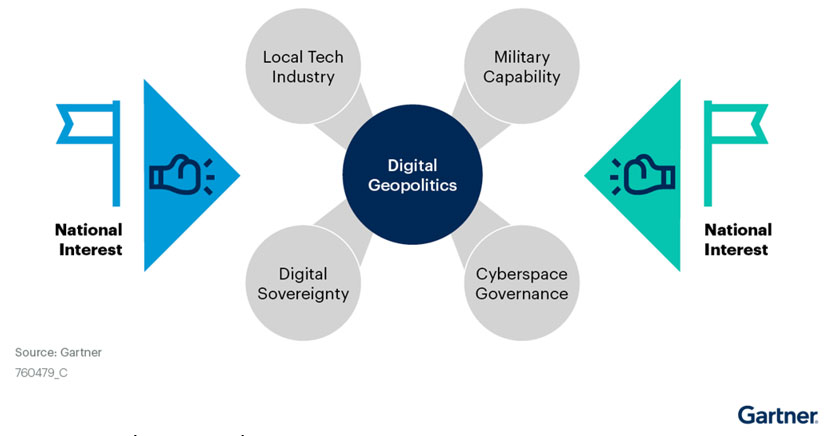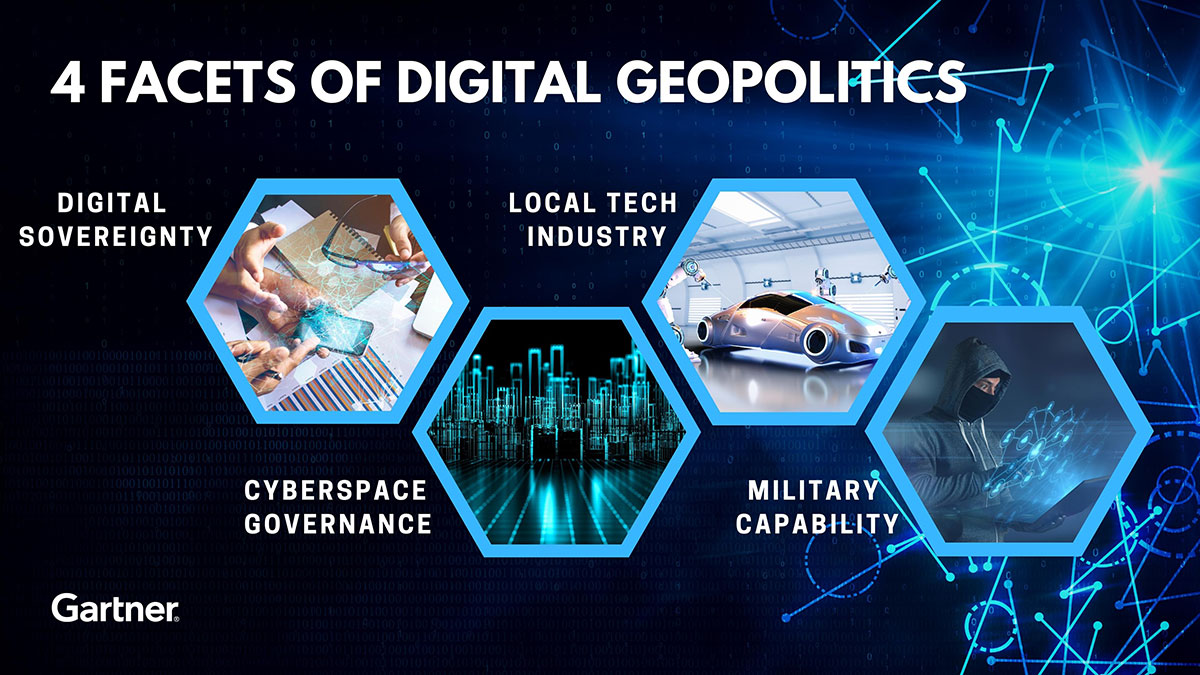Technology governance issues emanating from cross-country politics have led to digital geopolitics rapidly becoming an issue that multinational CIOs must step up to lead, according to Gartner, Inc.
Forty-one percent of Boards of Directors view geopolitical power shifts and turbulence as one of the biggest risks to performance, according to a Gartner survey. Gartner predicts that by 2026, 70% of multinational enterprises will adjust the countries in which they operate by hedging to reduce their geopolitical exposure.
“Digital geopolitics is now one of the most disruptive trends that CIOs must address, with many now dealing with trade disputes, legislation coming from one country that impacts global operations, and government imposed restrictions on the acquisition and use of digital technology,” said Brian Prentice, VP analyst and Gartner Fellow. “They need to get acquainted with this new reality and prepare for its impact.”
Geopolitics describes the geographic influences on power relationships in international relations. The resulting competition between nations plays out in many areas, including economic, military and society. Due to the increasing importance that digital technology plays in each of these areas, digital geopolitics is emerging as its own unique category of impact.
Gartner says CIOs must play a pivotal role in assessing corporate risk and, if required, rearchitecting digital systems. They will need to manage or exploit four distinct facets of digital geopolitics (see Figure 1).
Figure 1. Four facets of digital geopolitics

Source: Gartner (August 2022)
- Protect digital sovereignty
Digital sovereignty will be a primary source of complex, dynamic and expanding compliance obligations for multinational enterprises. Governments are primarily addressing it through their legislative and regulatory powers, such as privacy laws like the GDPR, and are increasingly turning to extraterritorial legislation. Companies that deal with the citizens of a jurisdiction are required to comply with its laws, regardless of where the company operates or where the citizens reside.
CIOs must be proactively engaged in ensuring that the IT organization’s operating model and practices reflect current laws and regulations in place. Their role is to be aware of the legal environment and articulate to other executives how the IT organization supports compliance across the enterprise.
- Build a local technology industry
The technology industry is of great interest to public policymakers around the world due to its size, fast growth, strategic importance, tax revenue, employment possibilities and lack of requirement for a specific national resource advantage.
Many national governments are investing in developing a home-grown tech sector. For example, the U.S. seeks to address regional imbalance in global chip production through the Creating Helpful Incentives to Produce Semiconductors (CHIPS) for America Act, and the Australian Government’s Digital Economy Strategy 2030 includes building a dynamic and emerging tech sector as a key pillar.
Efforts to establish a domestic technology industry provide CIOs with an opportunity for proactive engagement with governments. They must localize specific initiatives into countries that have the best integration between local expertise and access to government co-innovation support.
- Achieve necessary military capability
The growing digitalization of national military and security operations will limit the availability of some technologies within various countries. Enterprises and CIOs are impacted by the emerging sphere of cyberwarfare, as well as the digitalization of existing warfighting and security technologies.
CIOs can no longer count on the availability of technology used by the enterprise for its operations in any country in which it operates and will likely be faced with restricted and mandated suppliers. To minimize disruptions, they must establish a vendor and technology risk center of excellence, chartered with a regular assessment of the exposure of key suppliers to evolving government restrictions.
- Exert direct control over the governance of cyberspace
National competition for control over the governance of cyberspace will impact the operations of multinational enterprises. As digital technology weaves itself through all aspects of society, nations are seeking to ensure that their own technologies reflect and support their core values and their citizens. Governments are increasingly concluding that they need a protected national digital infrastructure.
The machinations by governments for control over cyberspace governance are beyond the influence of CIOs, but they will have profound impacts on a business’ ability to operate internationally. CIOs can advance the executive team’s understanding of cross-national competition for control over cyberspace and the impacts to their enterprise’s operations by leading an annual cyberspace environmental update briefing.
Gartner clients can read more in “What Forces Are Driving Digital Geopolitics and Where CIOs Should Focus” and “3 Critical Actions for Executives to Cope With Long-Term Impacts of Geopolitical Tensions.”
การ์ทเนอร์ชี้ผลกระทบของการกำกับดูแลทางเทคโนโลยีที่เกิดจากการเมืองระหว่างประเทศได้นำไปสู่ยุคภูมิศาสตร์การเมืองทางดิจิทัล (Digital Geopolitics) อย่างรวดเร็ว และกลายเป็นประเด็นสำคัญที่ผู้บริหารไอที (CIO) ในบริษัทข้ามชาติต้องแสดงบทบาทผู้นำ
จากการสำรวจของการ์ทเนอร์ ระบุว่าคณะกรรมการบริหารขององค์กรต่าง ๆ 41% มองประเด็นการเปลี่ยนแปลงอำนาจและความวุ่นวายทางภูมิศาสตร์การเมืองเป็นหนึ่งในความเสี่ยงใหญ่ที่สุดต่อการดำเนินธุรกิจ โดยการ์ทเนอร์ยังคาดด้วยว่าภายในปี 2569 องค์กรข้ามชาติถึง 70% จะปรับทิศทางการดำเนินงานในประเทศต่าง ๆ โดยมุ่งเน้นการป้องกันความเสี่ยงเพื่อลดการเปิดเผยข้อมูลทางภูมิศาสตร์การเมือง
ไบรอัน เพลนติส รองประธานฝ่ายวิจัยการ์ทเนอร์ กล่าวว่า “ภูมิศาสตร์การเมืองดิจิทัลเป็นหนึ่งในแนวโน้มที่สร้างความปั่นป่วนที่สุดที่ผู้บริหารไอทีต้องรับมือ โดยเวลานี้มีผู้บริหารมากมายกำลังจัดการกับข้อพิพาททางการค้า หรือกฎหมายของประเทศใดประเทศหนึ่งที่กระทบต่อการดำเนินงานไปทั่วโลก และข้อจำกัดในการจัดหาและใช้เทคโนโลยีดิจิทัลที่รัฐบาลเป็นผู้กำหนด ซึ่งผู้บริหารไอทีจำเป็นต้องทำความเข้าใจกับสิ่งที่เกิดขึ้นนี้และเตรียมพร้อมรับมือกับผลกระทบ”
ภูมิศาสตร์การเมือง (Geopolitics) อธิบายถึงอิทธิพลทางภูมิศาสตร์ที่มีต่อความสัมพันธ์เชิงอำนาจระหว่างประเทศ อันเป็นผลจากการแข่งขันระหว่างประเทศที่เกิดขึ้นในหลายพื้นที่ ซึ่งเป็นการแข่งขันทาง เศรษฐกิจ การทหาร และทางสังคม เนื่องจากความสำคัญของเทคโนโลยีดิจิทัลที่เพิ่มขึ้นในแต่ละพื้นที่ ภูมิศาสตร์การเมืองดิจิทัล (Digital Geopolitics) จึงเกิดขึ้นที่มีผลกระทบอย่างโดดเด่นชัดเจน
ผู้บริหารไอทีต้องแสดงบทบาทสำคัญเพื่อประเมินความเสี่ยงต่อองค์กร พร้อมจัดระบบโครงสร้างสถาปัตยกรรมดิจิทัลขึ้นใหม่ถ้าจำเป็น โดยพวกเขาจะต้องจัดการหรือใช้ประโยชน์จากภูมิศาสตร์การเมืองดิจิทัล 4 ด้านเด่น ดังนี้ (ตามภาพที่ 1)
ภาพที่ 1 ภูมิศาสตร์การเมืองดิจิทัล 4 ด้าน

ที่มา: การ์ทเนอร์ (สิงหาคม 2565)
- ปกป้องอธิปไตยดิจิทัล (Protect Digital Sovereignty)
อธิปไตยดิจิทัลจะเป็นแหล่งหลักที่มีความซับซ้อน มีพลวัตและขยายตัวเรื่อยๆ ของแนวทางการปฏิบัติตามกฎระเบียบสำหรับบริษัทข้ามชาติ รัฐบาลของประเทศต่าง ๆ จัดการเรื่องนี้ผ่านอำนาจนิติบัญญัติและการกำกับดูแล เช่น กฎหมายความเป็นส่วนตัว หรือ GDPR และกำลังขยายขอบเขตการบังคับใช้กฎหมายนอกอาณาเขต (Extraterritorial Legislation) มากขึ้น โดยหน่วยงานหรือองค์กรต่าง ๆ ที่ต้องติดต่อหรือทำธุรกรรมกับพลเมืองในเขตอำนาจศาลของประเทศหนึ่ง ๆ จะต้องปฏิบัติตามกฎหมายของประเทศนั้น ไม่ว่าองค์กรจะดำเนินธุรกิจที่ใดหรือพลเมืองนั้นอาศัยอยู่ที่ใด
ผู้บริหารด้านเทคโนโลยีสารสนเทศต้องมีส่วนร่วมในเชิงรุกเพื่อให้แน่ใจว่ารูปแบบการดำเนินงานด้านเทคโนโลยีสารสนเทศขององค์กรและแนวทางปฏิบัติต่าง ๆ นั้นเป็นไปตามกฎหมายและระเบียบข้อบังคับในปัจจุบัน ซึ่งบทบาทของพวกเขาคือการตระหนักถึงสภาพแวดล้อมทางกฎหมายและพูดคุยกับผู้บริหารอื่น ๆ ถึงแนวทางขององค์กรว่าเอื้อต่อการปฏิบัติตามข้อกำหนดทั่วทั้งองค์กรอย่างไร
- สร้างอุตสาหกรรมเทคโนโลยีท้องถิ่น (Build a local technology industry)
อุตสาหกรรมเทคโนโลยีอยู่ในสายตาและเป็นที่สนใจอย่างมากสำหรับผู้กำหนดนโยบายสาธารณะทั่วโลก ด้วยขนาด การเติบโต ความสำคัญเชิงกลยุทธ์ รายได้จากภาษี ความเป็นไปได้ของการจ้างงาน และไม่ค่อยมีการเรียกร้องเพื่อให้ได้มาซึ่งความได้เปรียบด้านทรัพยากรของประเทศในด้านใดโดยเฉพาะ
รัฐบาลหลายประเทศกำลังลงทุนในการพัฒนาอุตสาหกรรมเทคโนโลยีของตน ตัวอย่างเช่น สหรัฐฯ พยายามแก้ไขความไม่สมดุลระดับภูมิภาคของการผลิตชิปทั่วโลก ผ่านกฎหมายสร้างแรงจูงใจให้ผลิตเซมิคอนดักเตอร์เพื่ออเมริกา ในชื่อกฎหมาย CHIPS for America Act (หรือ Creating Helpful Incentives to Produce Semiconductors for America Act) และรัฐบาลออสเตรเลียที่นำเสนอแผนยุทธศาสตร์เศรษฐกิจดิจิทัลปี 2030 (Digital Economy Strategy 2030) รวมถึงการสร้างอุตสาหกรรมเทคโนโลยีเกิดใหม่และมีพลวัตเป็นเสาหลักสำคัญในการขับเคลื่อนประเทศ
ความพยายามในการจัดตั้งอุตสาหกรรมเทคโนโลยีภายในประเทศ ทำให้ผู้บริหารไอทีมีโอกาสสร้างการมีส่วนร่วมเชิงรุกกับภาครัฐฯ โดยต้องปรับแผนการดำเนินงานให้เหมาะสมกับท้องถิ่นและบูรณาการระหว่างความเชี่ยวชาญระดับท้องถิ่นกับการเข้าถึงการร่วมสนับสนุนทางนวัตกรรมของรัฐบาลให้เข้ากันอย่างที่สุด
- บรรลุขีดความสามารถทางทหารที่จำเป็น (Achieve necessary military capability)
การเติบโตและเปลี่ยนแปลงด้านดิจิทัลที่เพิ่มขึ้นของภารกิจทางการทหารและความมั่นคงแห่งชาติจะจำกัดความพร้อมของบางเทคโนโลยีในประเทศต่าง ๆ ซึ่งองค์กรและผู้บริหารไอทีต่างได้รับผลกระทบจากสงครามไซเบอร์ใหม่ ๆ ตลอดจนการใช้ประโยชน์ทางเทคโนโลยีที่มีอยู่ในด้านการสู้รบและเทคโนโลยีด้านความปลอดภัย
ซีไอโอไม่สามารถพึ่งพาความพร้อมของเทคโนโลยีที่องค์กรเคยใช้ได้กับการดำเนินงานในประเทศใด ๆ ก็ได้อีกต่อไป และมีแนวโน้มว่าจะต้องเผชิญกับซัพพลายเออร์ที่ถูกจำกัดและดำเนินงานตามคำสั่งเท่านั้น ดังนั้นเพื่อลดปัญหาการหยุดชะงัก พวกเขาต้องตั้งศูนย์กลางของผู้จัดจำหน่ายและความเป็นเลิศด้านความเสี่ยงทางเทคโนโลยี เพื่อใช้ประเมินความเสี่ยงของซัพพลายเออร์หลักร่วมกับข้อบังคับของรัฐบาลที่เปลี่ยนแปลงอยู่ตลอด
- ควบคุมโดยตรงให้ครอบคลุมธรรมาภิบาลของไซเบอร์สเปซ (Exert direct control over the governance of cyberspace)
การแข่งขันระหว่างประเทศเพื่อควบคุมการกำกับดูแลไซเบอร์สเปซจะส่งผลกระทบต่อการดำเนินงานของบริษัทข้ามชาติ ขณะที่เทคโนโลยีดิจิทัลหลอมรวมสังคมในทุก ๆ ด้านเข้าด้วยกัน ประเทศต่าง ๆ พยายามสร้างความมั่นใจว่าเทคโนโลยีของตนเองนั้นสะท้อนและสนับสนุนค่านิยมหลักรวมถึงการดำเนินชีวิตของพลเมืองของตน ซึ่งรัฐบาลต่าง ๆ ได้ข้อสรุปเพิ่มมากขึ้นว่าโครงสร้างพื้นฐานดิจิทัลระดับประเทศที่ได้รับการป้องกันคือสิ่งที่พวกเขาต้องการ
แม้แผนงานควบคุมกำกับดูแลไซเบอร์สเปซของภาครัฐจะอยู่นอกเหนือหน้าที่ของซีไอโอ แต่ผู้บริหารไอทียังมีบทบาทสำคัญกับความสามารถของการดำเนินธุรกิจในระดับสากล ที่ช่วยเพิ่มความเข้าใจให้แก่ผู้บริหารท่านอื่น ๆ เกี่ยวกับการแข่งขันระหว่างประเทศเพื่อควบคุมไซเบอร์สเปซ รวมถึงประเมินผลกระทบต่อการดำเนินงานขององค์กร ด้วยการทำบรรยายสรุปประจำปีเกี่ยวกับสภาพแวดล้อมของไซเบอร์สเปซใหม่ ๆ
ลูกค้าการ์ทเนอร์ สามารถคลิกอ่านข้อมูลเพิ่มเติมได้ที่ “What Forces Are Driving Digital Geopolitics and Where CIOs Should Focus” และ “3 Critical Actions for Executives to Cope With Long-Term Impacts of Geopolitical Tensions.”

